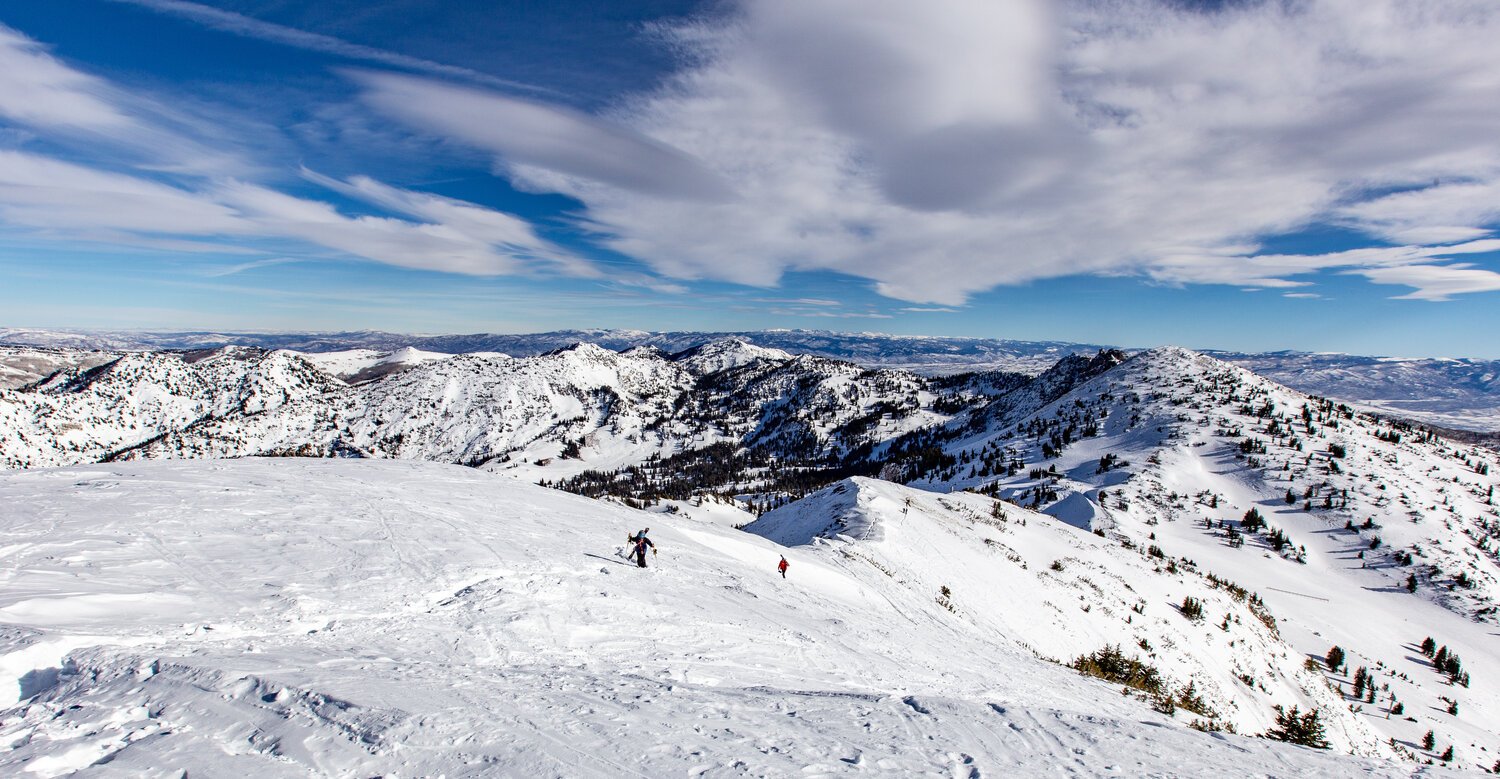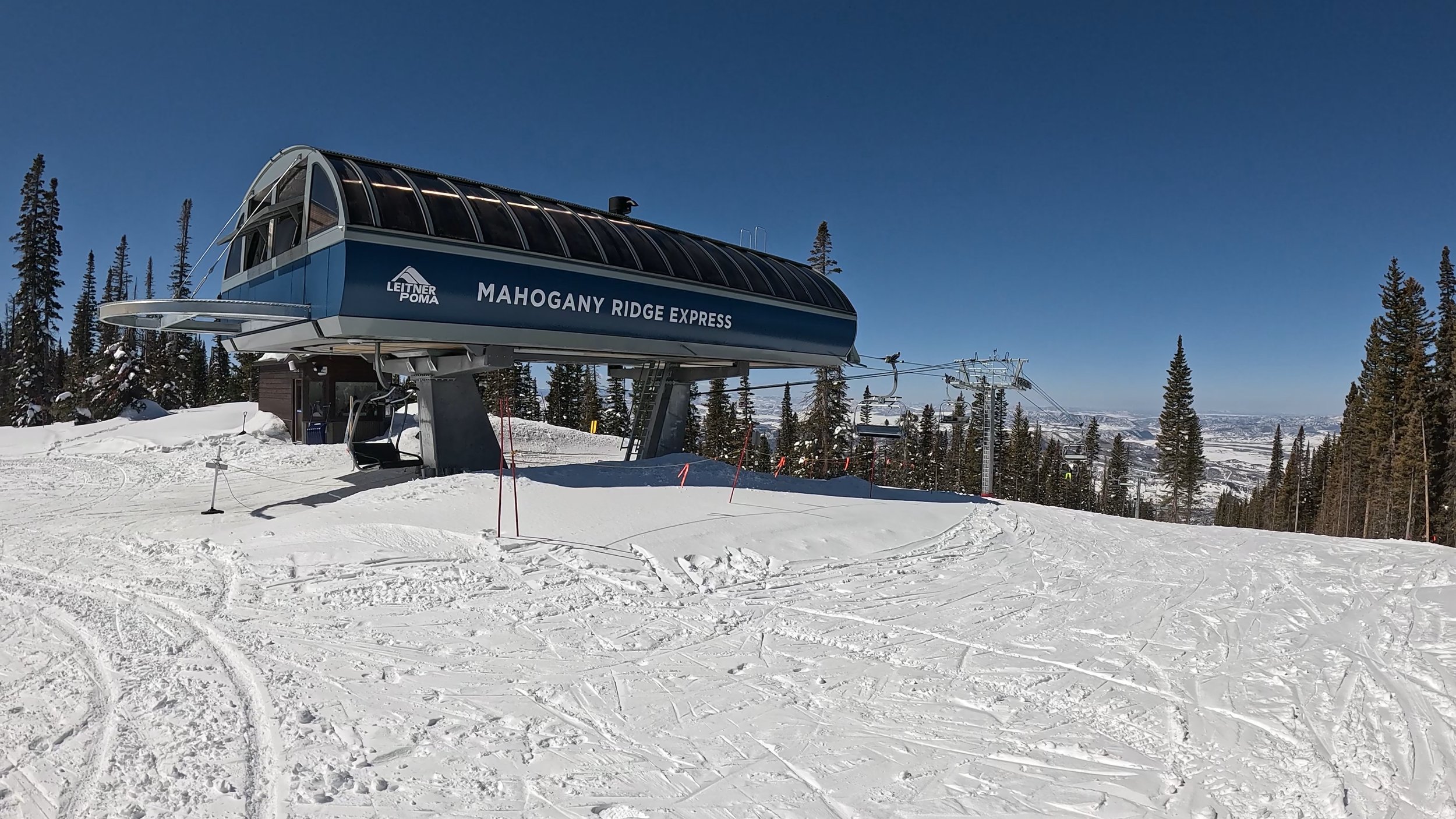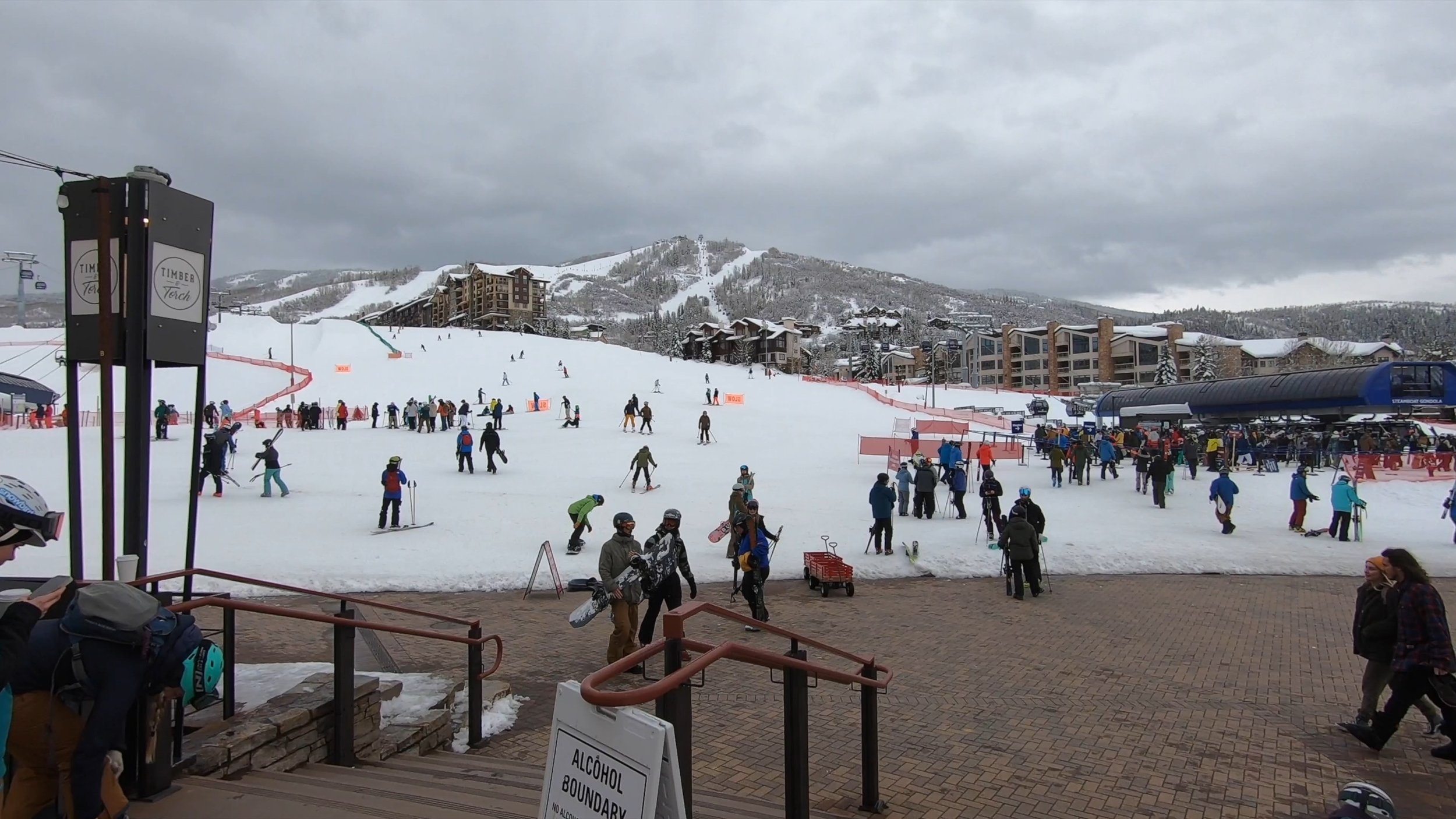Mountain Review: Steamboat
MOUNTAIN SCORE
CATEGORY BREAKDOWN
See our criteria8
Snow:
8
Resiliency:
8
Size:
8
Terrain Diversity:
8
Challenge:
7
Lifts:
6
Crowd Flow:
7
Facilities:
5
Navigation:
6
Mountain Aesthetic:
GOOD TO KNOW
1-Day Ticket: $194-$289
Pass Affiliation: Ikon Pass
On-site Lodging: Yes
Après-ski: Extensive
Nearest Cities: Denver (3.5 hrs), Salt Lake City (6.5 hrs)
Recommended Ability Level:
+ Pros
Distinctive glade terrain
Snow quality
Sizable footprint
Lively local town
– Cons
Less striking footprint than some competitors
Underwhelming bowl terrain
Ease of access to expert terrain
MOUNTAIN STATS
Lifts: 23
Trails: 182
Beginner: 14%
Intermediate: 42%
Advanced/Expert: 44%
RECENT ARTICLES
VIDEO
Mountain Review
Located hours away from Denver and the Continental Divide, Steamboat has long been a go-to alpine destination. This northern Colorado ski resort has historically stood out for its historic mountain town and extensive tree skiing, but in years’ past, it’s also been bogged down by issues with lift logistics and expert terrain access.
But in recent years, Steamboat has made a substantial series of investments that cut right at the heart of its biggest issues. So has the resort finally become competitive in the cutthroat Colorado destination market? Let’s take a look.
Steamboat delivers on high-quality Colorado snow, with the resort sometimes seeing storms that pass over the central and southern mountains in the state.
Snow and Resiliency
When it comes to a Colorado Rockies ski vacation, the first thing that often comes to mind is snow. And in this respect, Steamboat tends to deliver. The resort gets as much snow as the best resorts in Colorado and regularly sees powder each season. Since Steamboat is northwest of most of the popular mountains in the state, it can get hit by storms that never even make it to the Front Range—although the opposite effect can happen as well.
While still quite high, it takes less time to acclimate to the altitude at Steamboat than at many competing mountains; the resort tops out at only 10,568 feet, thousands of feet lower than most of the resorts along the Interstate 70 corridor. Steamboat’s long vertical drop means that lower-elevation trails see more variable conditions than the rest, but extensive early season snowmaking operations ensure a resilient base layer throughout the season.
TRAIL MAP
Tree Skiing
The snowfall contributes significantly to Steamboat’s strongest asset—its top-tier tree skiing. On-site woods—of which there are an abundance since most of Steamboat is below treeline—tend to have enough snow and spacing to consistently work as glades throughout the season. There are glades for skiers of multiple abilities here, from gently-sloped blues to consistently steep blacks. It takes a long time for the snow in the trees to be tracked, and it’s possible to find powder stashes in the trees even days after a snowstorm.
Steamboat’s aspens, which line trails and make up a sizable chunk of glade terrain, give the resort a distinct look. These light tan trees are widely spaced and don’t have as many low-hanging branches as pine trees, making them easier to navigate and carve lines through than typical glades.
Intermediate and advanced skiers may find untracked powder stashes even days after a storm in Steamboat's abundant glades.
Beginner Terrain
Steamboat’s beginner experience has always been on the better side as far as Colorado resorts go, as its Sunshine Peak area boasts upper-mountain green terrain—something that many competitors lack. But the resort’s beginner experience has gotten even better in recent years, especially for first-timers. The new Greenhorn Ranch learning area brings a new isolated mid-mountain bunny hill zone that’s served by a dedicated carpet and brand-new high-speed quad.
Steamboat features a strong selection of beginner terrain across several mountain areas.
Intermediate Terrain
Steamboat offers a range of blue-rated intermediate trails across the vast majority of mountain areas. These runs involve moderately steep pitches and often feature some of the best views at the resort. Steamboat also employs a blue-black trail rating, where runs are a bit steeper than typical blues but not quite up to an advanced-level pitch or technicality.
However, grooming on Steamboat’s blues can be hit or miss depending on when you visit. On some days, carvable groomers are ample in quantity, while on others, groomed blue terrain is nary a sight—with some degree of bumps really difficult to avoid. It generally seems that fewer runs get groomed if it’s snowed, even if accumulation numbers are small, but for an in-advance trip, it’s hard to predict when grooming will be good or not. This can be especially frustrating given Steamboat’s family-friendly reputation.
Grooming can be unpredictable at Steamboat, especially after a storm.
Advanced Terrain
Speaking of bumps, Steamboat’s advanced-level trails tend to have them in spades. These runs are reasonably steep and demanding, and repeat laps will wear down typical guests. Visitors will want to check out the Storm Peak, Sundown, and Pony Express for the best black runs, and many of these trails are directly adjacent to the best glades at the resort. If conditions permit, some of the blacks off Sunshine Peak and near the bottom of the mountain receive grooming, allowing for some serious speed runs.
Terrain Parks
Steamboat offers a pretty compelling terrain park for Colorado, with all of its freestyle features sitting off the lower-mountain Christie Peak Express lift. The resort offers three distinct terrain parks with features ranging from small to large, including boxes, rails, jumps, and jibs. Steamboat’s large park also often boasts a halfpipe once snow conditions allow.
RECOMMENDED SKIS FOR STEAMBOAT
NOTE: We may receive a small affiliate commission if you click on the below links. All products listed below are unisex.
Recommended intermediate ski
Recommended advanced ski
Recommended high-alpine ski
Recommended powder ski
High-Alpine Bowl Terrain
Steamboat’s terrain footprint starts to show its shortcomings in the high-alpine department. The back bowls at Morningside Park feel also-ran for what you might expect from a resort of this caliber. Snow quality tends to be good, but above-treeline skiing continues only for the first few turns, and steep slopes only continue for the next couple after that. After that, you’re subject to flat terrain that on powdery days requires a catwalk. Once you get to the bottom, you’re stuck taking the slow, fixed-grip Morningside lift back up.
Expert Terrain
But in recent years, another historical shortcoming—expert terrain—has been addressed in large part. The massive Mahogany Ridge and Fish Creek Canyon zones, which have added over 500 acres of skiable terrain to Steamboat, exclusively serve advanced and expert terrain and bring some of the best steep skiable terrain in the state.
The fully-lift-served Mahogany Ridge brings a barrage of bump runs, aspen trees, and tighter glades that are barely even tree cut, making for some of the most natural-feeling slopes at the resort. But for those who can handle it, Fish Creek Canyon is the most exciting new piece of terrain at a Colorado ski resort in quite some time. This double-black terrain zone starts at a series of gates with some rather daunting warning signs; while not as truly extreme as some terrain at resorts like Crested Butte and Arapahoe Basin, the Fish Creek Canyon trails are no doubt experts only, with intensely steep gradients and distinctive fall lines with unique obstacles—including a rock garden if you can find it.
Steamboat's new Fish Creek Canyon expansion includes some of the best expert terrain in Colorado.
But the most pleasant Fish Creek Canyon surprise of all is that the so called 30-45 minute “hike back” is hilariously exaggerated, being pretty much a hike in name only. The journey out involves two-to-three sections of sidestepping and a few flat areas, but at least if you’re a skier, it’s actually fairly lappable—and much more so than Steamboat’s warnings would have you believe.
Outside of Mahogany Ridge and Fish Creek Canyon, the Christmas Tree Chutes and a few hikable areas north of them are the only areas of the resort with true expert terrain, including cliffs and some dangerously steep pitches. While thrilling for experts, they are very difficult to find—you have to travel to the top, ski down the backside, and take the Morningside lift just to get there—even though they’re on the front face of the mountain. In addition, just as at Morningside Park, the expert-level terrain doesn’t last very long. White there is some sidestepping required to get out, Fish Creek Canyon is now the place to be at Steamboat for repeat expert laps.
Lift and Navigation Logistics
The lift and navigation logistics at Steamboat still aren’t perfect, but they’ve been addressed in large part by other recent investments. Access to the resort comes through one base area, but unlike in previous seasons, there are now three lift routes—rather than two—to get up the mountain. This is thanks to the recently-completed two-stage Wild Blue Gondola, which extends all the way to the summit of Sunshine Peak and finally provides a way to get up and down the resort without going through the Thunderhead Lodge mid-point.
The new 10-passenger gondola complements the two pre-existing routes to mid-mountain: the 8-passenger Steamboat Gondola, and the more indirect combination of the Christie Peak six-pack to the Thunderhead high-speed quad. The Wild Blue Gondola has done wonders to reduce lines in the mornings, making it a lot less of a hassle to get up the mountain when you arrive at the beginning of the day. Lift lines do still build up on weekends and holidays, but they’re far more manageable than they used to be.
Steamboat's new Wild Blue Gondola extends all the way from the resort's base to Sunshine Peak in two stages.
Steamboat’s lower-mountain lift setup causes some problems getting back to the base, but as with getting up the mountain, the experience has improved in recent years. If you want to ski directly out from the mid- and upper-mountain slopes to the base, access is fairly limited. If you’re north of the Thunderhead Lodge, you either need to take a long, relatively flat green trail to get down or take the Burgess Creek lift to Thunderhead to get down a more enjoyable way. If you’re south of there in the Sunshine Peak area, there’s no intuitive direct option to get down to the base—if you’re not an advanced-level skier and you don’t know exactly what you’re doing, the main option is to take the Elkhead Express lift to get to terrain that can actually lead you down to the base. If you end up at Elkhead at the end of the day, you may need to wait in a very long line to leave the resort. At least the Wild Blue Gondola, which allows downloading from the peak, now provides a much-less-crowded alternative to leave the resort from the top of Sunshine Peak.
Despite some quirks in its resort setup, getting around Steamboat isn’t all bad. It’s easy to lap most of the resort’s signature tree terrain once you get to it. In addition, all mountain areas besides those served by Morningside benefit from available high-speed lift service. And thankfully, the resort’s array of mid-mountain lodges allow you to catch a break during the day without heading all the way down to the base.
Resort Signage
Signage at Steamboat is generally clear and easy to read. However, at least as of early 2024, Steamboat has not gotten around to promoting its new expert-oriented Mahogany Ridge and Fish Creek Canyon terrain expansions, with nonexistent signage to this area until one arrives at the top of the Pony Express lift (at which one would have had to litigiously study the trail map to get to anyway). The difficult-to-find nature of this area has resulted in few-and-far-between lift lines, even during peak times.
Steamboat is mostly devoid of significant development, although its flat summit doesn't offer the same stunning views as some competitors.
Mountain Aesthetic
Steamboat’s mountain aesthetic generally impresses, although the flat summit areas won’t match the tops you’ll find at other Colorado resorts. Upper mountain runs offer picturesque views of the valley and neighboring peaks, and you won’t find the same aspen tree landscapes anywhere else. While Steamboat Village is fairly built up, the fairly inset rest of the mountain doesn’t have much development on it.
The town of Steamboat is also notable for the number of olympians that it produces, and the resort has long been a training ground for alpine athletes. According to multiple locals, it’s common to see former olympic athletes on the slopes here.
Night Skiing
It’s also worth noting that Steamboat offers night skiing on a small portion of its terrain. While it’s only 5 trails, it’s better than nothing and a useful option for those wanting to hit the slopes later in the day.
RECOMMENDED SNOWBOARDS FOR STEAMBOAT
NOTE: We may receive a small affiliate commission if you click on the below links. All products listed below are unisex.
Recommended intermediate board
Recommended advanced board
Recommended high-alpine board
Recommended powder board
Getting There
Like other I-70 Corridor ski areas, Keystone’s closest city is Denver. With no traffic, the resort is about two hours from the Denver International Airport—however, weekend drives often come with serious backups on Interstate 70, which is the only practical road to the resort from the east. Visitors can also fly into the Eagle County Regional Airport, which is just over an hour from the resort but typically pricier to fly into. A number of shuttle services exist to and from both airports.
Lodging and Parking
Steamboat offers multiple lodging options both on-site and in town. Most hotels and condos at the base come with hot tubs and pools. Some nice options near the base are reasonably priced and within walking distance of base village attractions. Lodging in the town of Steamboat Springs is economical, charming, and centrally located for nightlife, but more than a mile away from the base; buses to and from the resort run every 20 minutes during the day and every 30 minutes in the evening.
There is some free public parking at the resort, but in most cases, you either have to walk a few minutes to get to the slopes or take a shuttle bus. In the case of the Meadows parking lot, there is a pulse gondola nearby, but its low capacity results in long lines that often make it slower than just waiting for the shuttle. Steamboat’s free lots fill up on busy days, so if you get there after 10 on a weekend or holiday, prepare to shell out money for a paid spot.
Steamboat offers multiple on-site lodging options in its expansive base village.
Après-ski
Steamboat really stands out as a ski town destination. Steamboat Springs is a real town—it’s not an artificial village that was constructed with the resort—and it offers multiple bars, breweries, and small clubs, with options ranging from casual to lively. You can find live music and dancing most nights of the week, but the best partying happens on weekends.
But you don’t have to go directly into town to have a good time off the slopes. The Steamboat base boasts an excellent aprés-ski climate, with multiple slopeside happy hour bars that offer sweet food and drink deals. The resort often features live music at the base after the mountain closes, especially closer to the spring.
Perhaps unsurprisingly, the town of Steamboat Springs does have real hot springs. The Strawberry Park springs offer incredible scenery just outside town, while the Old Town hot springs are more built up but conveniently located downtown. Both venues stay open until at least 10pm every night, making them a great relaxation option after a long day of skiing. Oh—and Strawberry Park is clothing optional after dark, so maybe don’t bring your bathing suit.
Recent upgrades have made Steamboat competitive with many of the best resorts in Colorado for many visitors.
Verdict
So Steamboat still isn’t the most striking ski resort out there or the go-to for high-alpine bowl terrain. But so many of the fundamental issues that really hurt the overall experience are now a thing of the past, and the bustling town, enjoyable slopes, and world-class tree and mogul skiing make for a compelling proposition for those who don’t mind the extra drive from Denver.
Pricing
Unfortunately, one big reason to continue avoiding Steamboat is the resort’s absolutely insane ticket prices. For the 2024-25 season, ticket rates top out at $299, among the highest anywhere in North America. Tickets can be had for less if you buy really far in advance for an off-peak weekday, but with a starting rate of around $200, they’re by no means cheap.
Steamboat is an unlimited partner on the full Ikon Pass, a five-day partner with blackouts on the Ikon Base Pass, and a featured mountain on the day-ticket-like two-to-four day Ikon Session Pass; these days, it’s really only worth visiting if you have such a product.


























If you plan on visiting certain resorts on the Ikon or Mountain Collective Passes, now is your last time to secure access at a remotely reasonable rate.